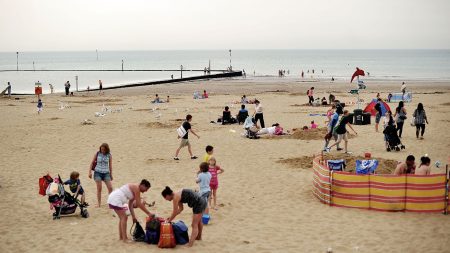The UK government is exploring the possibility of introducing a new tourist tax on accommodation, including campsites, hotels, and bed-and-breakfast establishments, potentially adding to the cost of staycations for both domestic and international travelers. This prospective tax, which could range from £1 per person per night at a campsite to £15 per person per night at a five-star hotel, is estimated to generate approximately £1 billion annually for the public purse. The government views this measure as a potential revenue stream to support public spending amid concerns about stagnant economic growth. While the Treasury declined to comment on the speculation, citing a policy against addressing tax rumors outside of formal fiscal announcements, the proposal has sparked debate about its potential impact on the tourism sector and affordability of holidays within the UK.
The rationale behind the proposed tax appears to be rooted in the government’s need to bolster its finances and address the current economic stagnation. Chancellor Rachel Reeves, while not directly confirming the tax, has emphasized economic growth as the government’s primary objective. She has positioned her budget as “non-negotiable,” highlighting its role in achieving economic stability and driving growth. The potential revenue from the tourist tax could contribute to this goal, providing additional resources for public services and investments. However, the implications for the tourism industry and the broader economy remain to be seen, raising concerns about potential negative impacts on the travel and hospitality sectors.
The proposed tax mirrors a similar initiative already in place in Manchester, where visitors are subject to a City Visitor Charge (CVC) of £1 per room per night. According to city officials, the CVC revenue is allocated to street cleaning and city marketing initiatives. This model suggests that the government’s proposed tourist tax could be similarly earmarked for specific purposes, potentially addressing local infrastructure needs or promoting tourism in different regions. Other cities, including Edinburgh, are reportedly considering implementing their own tourist taxes, potentially signifying a trend toward localized funding mechanisms for tourism-related expenditures.
The introduction of a national tourist tax would represent a significant shift in the UK’s approach to tourism funding, potentially following the model of many European countries where such taxes are commonplace. While the potential revenue generation is attractive, questions remain about the potential impact on the competitiveness of the UK tourism industry. The increased cost of staycations could deter domestic travelers, particularly during a period of economic uncertainty, and might also discourage international visitors, potentially impacting the hospitality sector and related businesses. Balancing the need for revenue with the potential negative consequences for the tourism industry will be a key challenge for the government.
The debate surrounding the proposed tourist tax highlights the complex relationship between government revenue generation, public spending priorities, and the health of the tourism sector. Supporters of the tax argue that it is a necessary measure to address funding gaps and support essential public services, while critics raise concerns about affordability, competitiveness, and the potential burden on businesses and travelers. The government’s decision on whether to implement the tax will likely involve careful consideration of these competing interests, alongside a thorough assessment of the potential economic and social impacts.
Further analysis is needed to fully understand the implications of the proposed tourist tax, including detailed projections of revenue generation, potential impact on tourism demand, and the distribution of costs and benefits across different segments of society. The government will likely face pressure from both the tourism industry and advocacy groups representing travelers, demanding careful consideration of the potential consequences. The final decision on the tourist tax will be a key indicator of the government’s approach to balancing fiscal responsibility with the needs of a vital economic sector like tourism.











